

INSIDE
Letter from the Dean P3
Accomplishments and Awards P4
Papua New Guinea Missions Trip P5
New MCAT Prep Class P8
Pence Boyce Undergraduate Summer Research P9
Engineering Senior Projects P10
Programs at a Glance P17
The Trip of a Lifetime P18
Total Solar Eclipse P22
STEM News P26
The Stars Align at Strickler
Planetarium P27
Olivet’s Nationally Recognized
Cybersecurity Program P29
STEM Faculty P30


Letter from the Associate Dean
Dr. Dale Hathaway, Associate Dean of the School of STEM
Dear Friends,
I am so grateful to welcome you to the second annual issue of the STEM Magazine! There are exciting things happening not only at Olivet, but specifically in the School of STEM and we want you to be aware of how your support is influencing students and changing lives. Students are not only gaining an outstanding education at Olivet, but they are also being taught to follow Christ and to serve others following the example He set for us.
For alumni, this Magazine gives a glimpse into the changes that have taken place at your alma mater, and may encourage you to visit the place that hopefully was a transforming positive experience during your college days. For prospective students, this Magazine lets you know some of the opportunities that are available to you. For donors, this Magazine is a THANK YOU! Thank you for providing resources
and opportunities that would not otherwise be available to our students. You may never meet some of the lives that your donations have influenced, but your imprint and the impact that comes with it is all over this Magazine, and more importantly, our students.
In this Magazine, you will read about trips to foreign countries and neighboring states that helped add to our students’ educational experience. There are recognitions of the great work that happen here every day along with more specialized opportunities like summer research.
May God bless you abundantly as we thank you for helping to provide what we need for the good work being done in STEM.
This Magazine includes just a portion of all that is going on—there is so much more to tell! Support to Engineering enabled the purchase of lab upgrades, new 3-D printers, and several laser printers so that students can work with state of the art machines. Thanks to additional support, students attended conferences and worked on projects which ultimately helped to support those with fewer resources in other less-developed countries.
As stated in 2 Corinthians 9:8, “And God is able to bless you abundantly, so that in all things at all times, having all you need, you will abound in every good work.” May God bless you abundantly as we thank you for helping to provide what we need for the good work being done in STEM.
Sincerely,
Dale K. Hathaway, Ph.D.
Top: Left to right, Charles Ogborn ’02, Professor Scott Ragan, Dr. Dale Hathaway
Cover spread: Total Solar Eclipse viewed by Olivet students on April 8, 2024 in Nashville, Indiana.
Student
Zoie Summers
Mathematics/Computer Science/Data Science ONU Student Employee of the Year, Benner Library
Evelyn Erickson
Actuarial Science/ Mathematics
Department of Mathematics Outstanding Graduate
Ethan Piacenti
Selected for NASA Europa Clipper Intern Program, Summer 2024
Ethan Mills Engineering Student Co-Op at Tesla, Spring 2024 through Summer 2024
McKenzie Rusink & Ashley Parry Chemistry
Presented at the Associated Colleges of the Chicago Area (ACCA), Spring 2024
Kyle Taylor Chemistry
Completed a Research Experience for Undergraduates (REU)
University of Kansas, Summer 2024
Rebekah McKay Biology
Performed research at ONU with Dr. Nick Troendle, Summer 2024
Faculty
Nationally recognized as a Best Christian College for
Co-editor with

PAPUA NEW GUINEA
This project would not have been possible without the generous support of several additional donors, including those of the Craighton T. and Linda G. Hippenhammer Faculty Scholarship Fund, the McGraw STEM Student Engagement Program Grant, the Elbert Pence and Fanny Boyce Undergraduate Summer Research Experience, Catalyst ONU, and ONU’s Shalom Project.
Student Research and Missions Collaborate in Papua New Guinea

Lucy and Dr. Vander Schaaf pose for a photo with the hospital’s HPV testing team, which included PNG nurses and missionary doctors who administered the gold-standard HPV tests & followup care to patients.
In the summer of 2024, a multidisciplinary team of ten Olivet faculty and students traveled to Kudjip Nazarene Hospital in Papua New Guinea (PNG) for a month to serve and learn on the mission station.
Dr. Michael Pyle and wife Nancy (both retired Olivet faculty), have led teams to this hospital for many years. The Pyles have a vision for inspiring future doctors and nurses to use their skills for
missions. This year, they were accompanied by Olivet professors Dr. Nicole Vander Schaaf and Dr. Michael Wade, who broadened the trip’s scope to include areas of their Ph.D. expertise, Molecular Biology and Civil Engineering, respectively. Six Olivet students accompanied them, including senior Pre-Med/Biology student Lucy Martinson.
Lucy knew that she wanted to conduct her research for Olivet’s Honors program on a topic that would make an important contribution and would help prepare her for medical school, but she had no idea this project would take her halfway around the world and help save the lives of women! Through conversations between Dr. Vander Schaaf, Lucy, and the doctors at Kudjip Hospital, it became obvious that one of the needs at the hospital was HPV

(human papillomavirus) testing.
High-risk strains of HPV can cause cervical cancer in women, and due to lack of vaccines and resources in the country, PNG has among the highest estimated burden of cervical cancer worldwide.
It’s here where Lucy’s project sought to meet this life-saving need. If women can be tested for high-risk HPV strains early
enough, precancerous lesions can be treated to prevent cervical cancer. The cost of HPV testing there is currently about 50 USD per test, making long-term testing unsustainable, but thanks to the generous support of a lead HPV researcher from Australia, Dr. Andrew Vallely, the hospital was able to offer HPV testing for a few hundred women this summer. As part of this project, Lucy began experimenting with


a low-cost technique for highrisk HPV testing called LAMP (loop-mediated isothermal amplification) to see if her results could match those of the goldstandard tests. She continues to investigate and optimize the LAMP test, hoping that someday low-resource hospitals like Kudjip might implement it.
Interested in partnering with future mission teams? Please reach out to Dr. Nicole Vander Schaaf (navanderschaaf@olivet.edu) to find out how you could help.
Top right: Lucy Martinson working in the hospital’s biosafety cabinet in PNG to optimize a low-cost HPV test for her Honors research project
Bottom right: : Pictured is Lucy demonstrating the low-cost HPV LAMP testing protocol to the hospital’s laboratory technicians.
Left: Pictured is the multidisciplinary Olivet team that traveled to PNG in the summer of 2024 which included six ONU students. Back row (left to right): Dr. Michael Wade, Dr. Michael Pyle, Abigail Lynn, Tori Orton. Front row (left to right): Dr. Nicole Vander Schaaf, Lucy Martinson, Carly Goetsch, Jolie Archer, Ellie Thompson, Mrs. Nancy Pyle.
New MCAT/DAT Prep Class
Supported
by Dr. Bruce Vogel ‘62
In the spring of 2023, Olivet’s School of STEM created a new course designed to prepare premedical and pre-dental students for their standardized entrance exams, the Medical College Admission Test (MCAT) and Dental Admission Test (DAT). Commercial preparatory classes for these exams routinely cost $2,500 or more, a price that was often prohibitively high for our students. But thanks to a generous donation from Dr. Bruce Vogel, ’62, Olivet is now able to offer this class each year to our students for no additional cost—even the books and practice exams are paid for.
The class is led by Biology professor Dr. Ryan Himes, who holds a Ph.D. in physiology. Dr. Himes reviews all the test content with the students, including physics, chemistry, behavioral science, and biology. Students meet with him each Wednesday night of the semester to study, ask questions, and take practice exams.
“The format of the class is really helpful,” says Dr. Himes, “because by meeting in person each week, it not only provides accountability, but mutual encouragement and motivation. The students share with one
another how they are doing with their studying, and we learn from and pray for each other.”
These graduate school entrance exams are highly rigorous—the MCAT, for example, covers seven subjects and takes over seven hours to complete. Adequately preparing requires discipline, perseverance, and stamina. Evidence reveals that the class has been a great help to the students so far. A current student who is preparing for the exam has improved her practice test scores by 30 percentiles. A student from the first class in 2023 improved her MCAT score by ten percentiles, and was recently accepted to five different medical schools! We are seeing students receive acceptance to medical and dental schools like Indiana University, Loyola University Chicago, Southern Illinois University, Midwestern University, and Liberty University.
One hundred percent of the first 12 students who took the class reported in an anonymous survey that they found the class to be extremely or somewhat helpful to their preparation.
The Walker STEM school plans to continue to offer this class to students each spring semester for the foreseeable future. We are grateful to Dr. Vogel for his
generous support, which not only provides an invaluable opportunity for current Olivet pre-medical and pre-dental students, but helps Olivet stand out to prospective students as well. To our knowledge, Olivet is the only university that provides a free, comprehensive MCAT/DAT prep course that is taught
By meeting in person each week, it not only provides accountability, but mutual encouragement and motivation.
in-person by a science professor with a Ph.D. If you know of high school students who are interested in becoming physicians or dentists, please let them know about this one-of-a-kind opportunity!



2024 Pence-Boyce Undergraduate Summer Research Experience
Students and faculty worked together over a ten-week period during the summer of 2024. The program, funded by anonymous and generous donors, has supported research in the STEM areas for over 20 years. The program is named in honor of two former Olivet faculty members, Elbert Pence, Professor of Physics, and Fanny Boyce, Professor of Mathematics,
Recipients for the 2024 Pence-Boyce Undergraduate Summer Research Experience at Olivet Nazarene University:
both of whom exemplified excellence in higher education.
“This wonderful program has been around for several decades and continues to support student research opportunities.
I am very excited to see it provide outstanding research opportunities for some of our best students” says Dr. Dale K. Hathaway, STEM Associate Dean and chair of the Pence-Boyce Research Committee.

JILLIAN BECKSFORT with Dr. David Hoekman, Biology
“Characterization of the Current Tallgrass Prairie Plant Communities and the Effect of Burning and Mowing on Prairie Plant Communities at the Swanberg Sanctuary”

LUCY MARTINSON with Dr. Nicole Vander Schaaf, Biology
“Screening for High-Risk HPV in Papua New Guinea and the Validation of a Low-Cost, High Risk HPV Assay” GRANT WHEELER with Dr. Willa Harper, Chemistry

“Synthesis of Uranyl Fluoride Heterocyclic Complexes via Dehydration Reaction: Analysis and Solubility Studies”
PROJECT

PROCESS SCALING AND OPTIMIZATION FOR MIXING AND FILTRATION OF COMPLEX BIOLOGICAL SUSPENSIONS
BENEFIT: Great exposure to pharmaceutical industry; Strong industrial mentoring team
CHALLENGE: Probably will want to develop expertise in new modeling tools, e.g. ANSYS Fluent CSL Behring produces lifesaving biopharmaceutical products. Its Bradley site is a leader in manufacturing biotherapy products from human plasma.
SOLAR-POWERED FISH POND AERATION SYSTEM
BENEFIT: Helpful sponsor with which to work on a ministry project; Travel to Guatemala
CHALLENGE: Aeration System this year has to be optimized and ready for mass production, requires long-term testing and Design of Experiments approach; Travel to Guatemala
DETAILS: Previous senior design project teams have designed a solar-powered aeration system for a small-scale tilapia farm in Guatemala. This year’s team will wrap up the previous work to be able to mass produce a low-cost, DC powered, efficient, robust system. Design prototypes will be evaluated through computer simulations and long-duration experiments. The team will travel to Guatemala to
perform some field testing of the aeration system. After donor and department contributions, the per-student cost needed for the trip is estimated to be $225.
For general project questions or connection to Guatemalan resources, contact Don Roe at dcroe63@gmail.com

OBJECTIVES: The primary objective of this project is to investigate and optimize the mixing dynamics and fluid filtration processes for complex suspensions containing liquids and solids. The focus will be on the Kistler-Nitschmann-Cohn (KNC) I+II+III suspension and aim to develop a comprehensive understanding of mixing dynamics and fluid filtration at various scales, allowing alignment of pilot-scale and small-scale conditions with full-scale operations. This will be achieved through two distinct parts of the study: Scale-down mixing dynamics and Fluid dynamics during filter press filtrations.
DETAILS AND DELIVERABLES:
Scale-Down Mixing Dynamics for Complex Suspensions (Fall Semester)
The purpose of this portion of the project is to model the full-scale, pilot-scale, and small-scale process vessels for mixing of the KNC I+II+III suspension under steady-state conditions using computational fluid dynamics. The purpose of the pilotscale and small-scale at CSL Behring is to support manufacturing operations in cases such as troubleshooting, implementation of process improvements and process development. It is important for the pilot-scale and small-scale to operate using conditions that mimic manufacturing as closely as possible. The goal of this project is to identify set points for the pilot-scale and small-scale mixing vessels to match conditions of the fullscale manufacturing while considering the limitations of the current equipment for the pilot-scale and small-scale.
Fluid Dynamics during Filter Press Filtrations (Spring Semester)
Similarly, the purpose of this portion of the project is to identify differences between the full- scale, pilot-scale, and small-scale KNC I+II+III step filtration. It is important for the pilot-scale and small-scale to operate using conditions that mimic manufacturing as closely as possible. The goal of this project is to identify any potential changes that could be implemented for the pilot-scale and small-scale filtration operations to match conditions of the full-scale manufacturing while considering the limitations of the current equipment for the pilot-scale and small-scale.
CONCLUSION: This proposal outlines a comprehensive study to optimize mixing dynamics and fluid filtration processes for complex suspensions. Through detailed simulations, measurements, and analysis, the aim is to provide actionable insights and recommendations that will enable the alignment of pilot-scale and small-scale operations with full-scale processes. It is anticipated through these objectives that improved process efficiency, reduced costs, and enhanced product quality will be achieved.
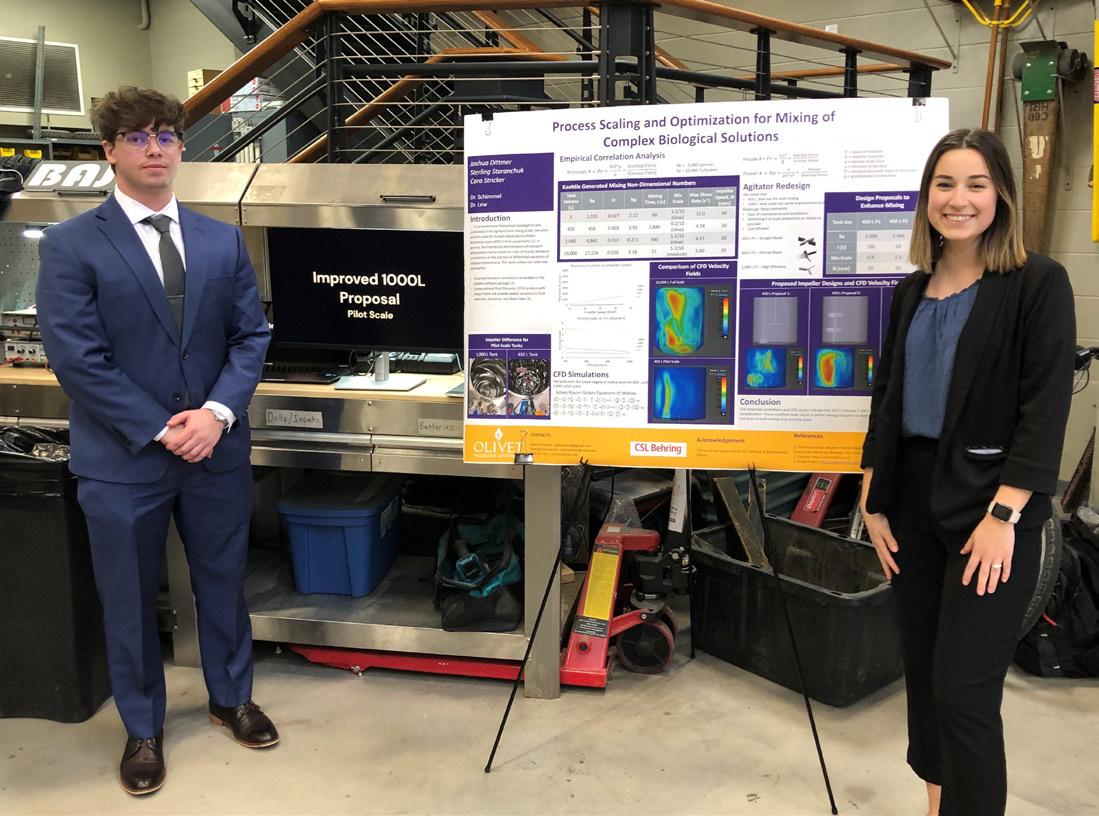
SPONSOR
DESCRIPTION
FACULTY MENTOR STUDENT TEAM MEMBERS
AgInno, McGraw STEM Student Engagement Fund, Day of Giving, Hosting families
Professor Wade Co-Mentor: Mr. Lovell
Carlos Gomez Gutierrez, Creighton Seibert, Olivia Wheeler
PROJECT
SPONSOR DESCRIPTION
FACULTY MENTOR STUDENT TEAM MEMBERS
CSL Behring Michael Bartkovsky, Chuck Arnold, Rachel Cressman
Professor Schimmel Josh Dittmer, Cara Serpe, Sterling Staranchuk
TUBE CONVEYOR
BENEFIT: Supportive industrial mentor, prior work done on project last year. CHALLENGE: Need to produce this year a prototype that meets all constraints. DETAILS: This project team will develop a system that can be added to a standard Peddinghaus conveyor to allow the conveyance of round tube. Round tube presents a challenge to move on a conveyor, as it does not have the planar contact with the conveyor rollers that the traditional steel shapes have. Due to its shape, it also will not reliably stay at the passline plane. The device that will be designed will have three main functions: 1) transmit torque from the conveyor rollers to the round tube to move the tube down the conveyor line, 2) keep the round tube located properly relative to the datum and passline planes, and 3) constrain the tube from rotating about its axis.

UNDER-DECK STORAGE FOR BASIC UTILITY VEHICLE (BUV)
FILAR MICROMETER FOR ONU PLANETARIUM
BENEFIT: Prior work done by honors student; Opportunity to work with another STEM unit on campus. CHALLENGE: May require learning new material property concepts. DETAILS: Tracking the orbits of double stars to strengthen the reliability of stellar mass calculations is an important aspect of astronomy that is currently receiving little attention. Since stellar evolution relies more heavily on stellar mass than any other characteristic, stellar mass data collections are some of the most important catalogs of astronomical parameters to maintain. Amateur astronomers use a filar micrometer paired with a telescope to take visual double star measurements. Unfortunately, current commercial filar micrometers, if available at all, are cost-prohibitive for most amateur astronomers. This design team will utilize CAD, 3D printing, and testing to develop a filar micrometer that amateur astronomers could produce cost-effectively. The project will build upon the prior work of a mechanical engineering Honors student, Emily Rull.

COMPETITION
Manufacturing, ONU Department of Engineering Society of Automotive Engineers
BENEFIT: Well-defined ministry project. CHALLENGE: Communication with project sponsor in Indianapolis. DETAILS: The Institute for Affordable Transportation (IAT) is a not-forprofit public charity devoted to improving the lives of the world’s poor by developing and building basic vehicles that facilitate community transformation — bridging the gap between vital services and people in need. The Basic Utility Vehicle (BUV) is a simple, rugged, low cost, low weight vehicle that is easy to operate, maintain, and repair. Designed for rural Africa off-road areas and heavy payloads, the BUV has high torque and does not require clutch shifting. Quality of life in Africa depends upon affordable transportation. Up to 40% of crops and produce spoil in Africa because the farmers cannot get them to market. BUVs allow more children to access school. BUVs transport expectant mothers to clinics safely, addressing the problem of 30% of births in Africa occurring in unsanitary locations because the mother could not get to a clinic in time.

BENEFIT: Long history of involvement in the Baja Competition. CHALLENGE: This is the year to build new vehicle model from scratch. Compete more successfully than in the past. DETAILS: In collaboration with the Baja SAE club, this design team is tasked with designing and fabricating a Baja vehicle with the goal of successfully competing in a 2023-24 Baja SAE Collegiate Design Series competition. The project will include all aspects of the vehicle, including but not limited to: roll cage, suspension, steering/ control, and drivetrain. The team will also manage the ONU Baja SAE Club.
Peddinghaus Nicholas Pickering
BUV Ministry
Will Austin, Founder and Director
Professor Agajanian Co-Mentor: Professor Weber, Mr. Lovell
Professor Lew Co-Mentor: Mr. Lovell
Josiah Paynter, Hannah Harris, Sam Bowden, Nicolas Fuentes
Madeline Barone, Hunter Bogart, Cindy Carrion, Ethan Piacenti
PROJECT
SPONSOR DESCRIPTION
FACULTY MENTOR STUDENT TEAM MEMBERS
ONU Strickler Planetarium, Environmental Science
Professor Weber Co-Mentor: Professor Case
William Anderson, Conner Moore, Paige Panush
PROJECT
DESCRIPTION
FACULTY MENTOR
STUDENT TEAM MEMBERS SAE-BAJA
Walker
Professor Schroeder Co-Mentor: Mr. Lovell
Scott Leonard, Michael Roath, Matthew Bair, Ethan Burt, Jacob Burt, Jordan Evans, Jotham Drayton
SPONSOR
ASCE STUDENT STEEL BRIDGE COMPETITION (SSBC)
BENEFIT: Opportunity to increase visibility of ONU Engineering. CHALLENGE: First time involvement in the competition. DETAILS: ASCE and the American Institute of Steel Construction (AISC) partner to offer the Student Steel Bridge Competition (SSBC). Each student team develops a concept for a scale-model steel bridge to span approximately 20 feet and to carry 2,500 pounds according to the competition rules for the year. The team must determine how to fabricate their bridge and then plan for an efficient assembly under timed construction conditions at the competition. Competition categories are aesthetics, construction speed, lightness, stiffness, construction economy, structural efficiency, and cost estimation. In addition, overall performance is rated. Special award categories include Team Engagement, Spirit of the Competition, Ingenuity, and Video.

EAA HOUSE DESIGN

CHALLENGE: Getting quick start on project that is currently undefined. DETAILS: Recent trends in the housing market, along with household income disparities, underscore the need for efficient, affordable, and accessible (EAA) housing for middle- to lower-middle income families. The average cost for construction in northeastern Illinois is $132.00 per ft². The EAA House team needed to create an alternative and versatile design for a variety of users within the greater Kankakee/ Bourbonnais/Bradley communities
E2I PROCESS CONTROL EXPERIMENT
Erickson, e2i Donations to the student chapter of the International Society of Pharmaceutical Engineers
BENEFIT: Simulations from ENGR 323 will be starting point for hands-on experiments. CHALLENGE: Need to design experiment equipment, order, construct, and test to have final product by the end of the year; ideally multiple setups for student groups to run simultaneously. DETAILS: Development of the Chemical Engineering Lab is focused on interdisciplinary experiments related to the food and pharmaceutical industries that are relevant to multiple ONU engineering concentrations. Additionally, experiments that can incorporate a process control component into them are a priority. The team working on this project will identify an existing experimental apparatus in the lab to develop with a process control component that will utilize software consistent with the approach to be used in ENGR 323 Automatic Controls. Some of the team members should have already taken ENGR 323.

HOCKING HILLS RETREAT CENTER ADVENTURE COURSE
BENEFIT: Supportive ministry sponsor who we have worked with before.
CHALLENGE: Prototype scaling.
DETAILS: This design team will design an Adventure Course (high ropes and low ropes) that will fit into the camp near Columbus Ohio managed by Shepherd Church of the Nazarene in Gahanna, Ohio.

American Institute of Steel Construction, McGraw STEM Student Engagement Fund, student fund-raising
Carlile Group
Professor Ragan Professor Ragan
Isaac Baker, Michael Byrne, Andrew Coble, Holden Devore
Jack Holohan, Matthew Carpenter, Faith Dalton, Payton Tindal
PROJECT
SPONSOR
DESCRIPTION
FACULTY MENTOR STUDENT TEAM MEMBERS
Eric
Professor Schimmel Marc Shuflit, Nathan Martin, Noelle Miller, Benjamin Tavares
PROJECT
SPONSOR
DESCRIPTION
FACULTY MENTOR
STUDENT TEAM MEMBERS
Shepherd Church of the Nazarene Pastor Rob Paugh Professor Ragan
Donavan Yelle, Valerie Froylan, Nathaniel Nargang, Samantha Paterson

Biological Sciences
Biology
Environmental Science
Science Education
Zoology
Chemistry & Geosciences
Chemistry
Chemistry Teaching
Earth and Space Science
Environmental Science
Geography
Geological Sciences
Physical Sciences
With 24 key areas of study and numerous degree and certificate options within each area, the Walker School of STEM offers the skills and opportunities to shape your future.
Engineering Concentrations
Architectural
Chemical & Biochemical
Civil Computer
Electrical
Mechanical
Mathematics & Computer Science
Actuarial Science
Computer Science
Computing Technology
Cybersecurity
Data Science
Mathematics
Mathematics Teaching
the TRIP of a

In the summer of 2024 Olivet Nazarene University partnered with sister school MidAmerica Nazarene University to take 14 students on the trip of a lifetime. Along with Dr. Nicholas Troendle of ONU and Dr. Rion Taylor of MNU these students spent 14 days in Zimbabwe and Namibia exploring the incredible diversity and beauty of God’s creation.
LIFETIME
The trip began at Victoria Falls, the widest falls in the world
After the falls, the group moved on to the Caprivi strip of Namibia where students were able to see African elephants, Cape Buffalo, and Hippopotamuses, up close in their native environment.

It is so cool to see the diversity God made in the world.
From there the group traveled to Brandberg to track and learn about the behavior of desert elephants. During this time students had the opportunity to view the southern skies without light pollution, giving them incredible views of the Milky Way, southern constellations, and the planet Venus.


Next up, they headed to the Namib desert to the Skeleton Coast where they had the opportunity to learn about Welwitschia plants, some of the oldest and most bizarre plants on earth. Some of the individual plants are over 2000 years old.

The trip rounded out with four days at Panorama, a private game preserve owned by Jamy Traut, where they learned about Namibian conservation, land conservancies, and concessions. During this time students had the opportunity to develop and conduct field research projects on several topics including sociable weaver birds, fire succession, and land rehabilitation and restoration.
Senior Zoology student, Amanda Listerman wrote, “It is so cool to see the diversity God made in the world.
It’s crazy how little overlap there is and we get to enjoy the creation from a whole new perspective with people who also appreciate God’s creation as well as the science, which is such a cool combination, and a special group of people.”
Students on the trip bonded quickly and developed friendships with each other regardless of which school they attended. Sophomore Toby Gallion wrote “It’s crazy how close you can get to people who were strangers a week ago. I’m so glad to be experiencing this, and God is teaching me a lot of things on this trip. Creation is beautiful.”

God is teaching me a lot of things on this trip.

Senior Amanda Listerman
Sophomore Toby Gallion
Students relax around the campfire while guide Emile teaches them about conservation in Namibia.
Mother elephant inspects the student’s vehicle to make sure it’s safe for her calf.
Wild African Cape Buffalo.
Students observing African animals gathered along the riverbank.
TOTAL SOLAR ECLIPSE

Olivet Science Students Travel to View Eclipse
Olivet
Students and professors had a second chance at a oncein-a-lifetime opportunity in April when the moon’s shadow swept across the United States, causing a total solar eclipse viewed by millions. The path of totality on April 8 stretched from Maine to Texas and was the second total solar eclipse visible from the continental United States in the past decade. Students from the Earth and Space Sciences program, thanks to support from a McGraw research grant, traveled to southern Indiana to view the eclipse and gather data in the hours leading up to totality and during the approximately four minutes of total darkness during the event.
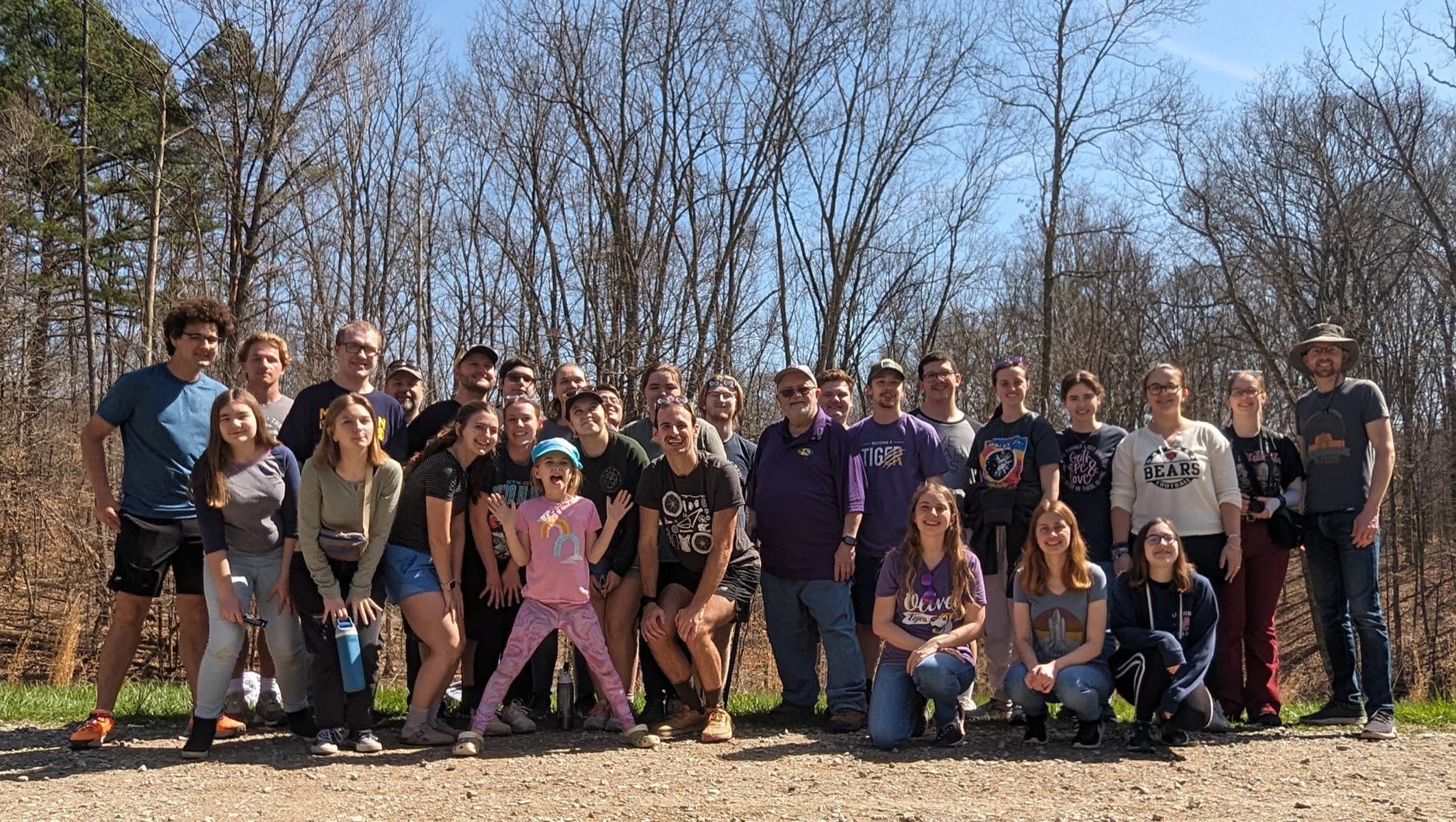

Dr. Charles Carrigan ’96 and Dr. Stephen Case ’05, who together led an expedition to southern Illinois to view the August 2017 total solar eclipse, also led this year’s trip. The 2017 eclipse took place during the summer months and thus limited student participation, but this year’s event offered the chance for nearly thirty students to attend the two-night expedition and witness the event. The group was also accompanied by Prof. Madeline Shepley, who joined the Earth and Space Science program at Olivet this year as professor and director of the Strickler Planetarium.
Students and professors traveled to Nashville, Indiana, and stayed at Camp Rancho Framasa, whose wooded hills provided an ideal viewing location. A clearing beside a large pond allowed an unobstructed view of the sky as well as the opportunity to participate in a NASA citizen science program observing wildlife behavior during the eclipse. Groups of students also monitored the changing ambient temperature and light levels as the moon blocked more and more of the sun’s face as totality approached.
“It felt like I was in a sci-fi movie,” noted Matthew Aude, a junior science education major. “The temperature drop was certainly surreal, and the eclipse itself was breathtaking.”
The weather at the observing site cooperated, remaining perfectly clear for the entire event. When the eclipse reached totality, students were treated to one of nature’s most phenomenal sights. As the moon completely blocked the sun, the solar corona became clearly visible, Jupiter and Venus were spotted in the darkened sky, and there was even a celestial surprise: a ruby-red solar prominence peaking over the moon’s edge. April 8, 2024
Dr. Steve Case, Professor, Department of Chemistry and Earth & Space Science
TOTAL SOLAR ECLIPSE

It was an unforgettable experience. When the sun reappeared, animals responded as though it was dawn. Frogs broke out in a loud chorus of croaking from the nearby pond.
“Even just a few minutes without the sun resulted in animals being confused,” noted Amy Johnson, a sophomore environmental science major. “I am so grateful that God has intricately created the universe to sustain life on Earth.”
Besides the one-in-a-lifetime celestial event, the trip was an opportunity for students to dialogue on issues of science and faith. The morning before the eclipse, Dr. Carrigan spoke to the group on the nature writings of Henry Thoreau, and students broke into discussion groups with professors. For Johnson, the shared experience was central.
“I found the community aspect to be the most meaningful part of the trip,” she explained. “Being surrounded by fellow excited classmates and intelligent professors who were equally
“God gave us the minds to grow, learn, and enjoy God’s creation, and we were able to experience something like none other.”

as excited to experience the eclipse definitely raised the anticipation.” After the eclipse the group continued fellowship around a campfire and used telescopes for evening observation of the spring night sky.
In Bourbonnais, which lay outside the path of totality, the eclipse coverage was around 95%, and students on campus viewed the event using eclipse glasses. The next total solar eclipse in the continental United States will occur in 2044, though totality will only be visible from Montana and the Dakotas. The next path of totality so close to Olivet’s campus won’t be until the year 2099.
For science students like Matthew Aude, the eclipse was a meaningful faith experience. “God gave us the minds to grow, learn, and enjoy God’s creation,” he notes, “and we were able to experience something like none other.”

Dr. Steve Case, Professor, Department of Chemistry and Earth & Space Science, Director, University Honors Program



Mathematics supported by Day of Giving donations
Professional Examinations and Advanced Mathematical Degree Application Support (PEMDAS)

The PEMDAS Fund is the result of a successful fundraising project during Olivet’s Day of Giving in 2023, 20 donors contributed nearly $5000 to this project; and it provides
an opportunity for students to be reimbursed for some of the expenses pertaining to application fees and exams as they advance in their educational endeavors. This fund is available to current
Olivet Adds MSM Program
Slated to launch in early 2025, a new Science, Technology, Engineering, and Math (STEM) related graduate program will begin. These Master of Science in Management (MSM) programs consist of 6 STEM-focused courses and 6 business-based courses. Expecting to grow, initially concentrations in Computer Science and Information Technology will be offered.
These proposed master’s degrees not only enhance Olivet’s academic reputation but also fulfill a niche in STEM management education. While staying true to Olivet’s mission and values, these programs represent a valuable addition to the university’s offerings. Furthermore, these programs align seamlessly with Olivet’s mission of providing high-quality academic instruction for personal development, career readiness, and service to God and humanity. They embody the university’s pillars of professional readiness, combining classroom learning with practical experience and spiritual
growth. By preparing students to be witnesses for God in their chosen fields, these programs contribute significantly to Olivet’s mission and cultural ethos.
Olivet students majoring in mathematics, math education, actuarial science, or data science who are planning to take actuarial exams, take Mathematics Content Tests, or apply for graduate schools in the mathematical sciences.
The fees for these important academic advancements can be costly. The first two Actuarial Exams are $250 each, the Illinois Mathematics Content Exam is $122, and graduate school applications often require a fee that ranges from $50 to $170. So far over $1100 has gone to education students paying for educational licensure exams and actuarial exams.
ALIGN AT STARS STRICKLER PLANETARIUM


August 2023 was the start of a new era at the Strickler Planetarium: The Department of Chemistry and Geosciences hired Indiana University and Ball State University alumna Madeline Shepley to helm the planetarium as its new director. In this first year of the new directorship, she has been busy getting started and engaging in Strickler’s mission to share the awe of God’s creation. To that effect, she has been expanding the planetarium’s catalog and advocating for much needed equipment upgrades.
In the past 12 months, she has acquired 4 new fulllength full dome shows. The first show obtained was “The Christmas Star”, a show that explores possible explanations for the Star of Bethlehem mentioned in chapter 2 of the Gospel of Matthew. Another new show, “100 Years of Eternity”, is about the history
of the modern planetarium which was created to celebrate the centennial of the birth of the modern planetarium. During this past summer two more shows were added, “Aurora: Lights of Wonder” to prepare patrons for the upcoming solar maximum and corresponding uptick in auroral activity and “The Great Solar System Adventure” to replace the outdated patron-favorite “Secret of the Cardboard Rocket”. In between all that, 12 short full dome shows about prominent visible variable stars and six short full dome shows about star lore of cultures around the world were acquired.
As a cherry on top, with the help of STEM Associate Dean Dale Hathaway, she has secured the approval of a long-needed projector upgrade, which should take place during the first half of 2025.

Madeline Shepley
Assistant Professor and Planetarium Director, Department of Chemistry and Geosciences



Olivet’s Nationally Recognized Cybersecurity Program
Olivet’s Cybersecurity program provides students with a robust learning experience. The program exposes students to hands-on learning, relevant technology, and extensive certification opportunities. The curriculum was built from the ground up with intention and substantial attention to detail. This diligence has proven fruitful.
Shortly before the Fall semester started, Olivet’s Computer Science department was notified that the Cybersecurity program was nationally recognized and officially designated as a National Center of Academic Excellence in Cyber Defense (NCAE-CD) by the National Security Agency (NSA). Olivet’s Cybersecurity program joins an elite group of less than 250 bachelor and graduate programs who have earned this designation. It is the culmination of years of planning and hundreds of hours of evidence gathering.
The NCAE-CD designation is awarded to “regionally accredited academic institutions offering cybersecurity degrees that demonstrate that it engages in significant community involvement, academic activities, and institutional practices in cybersecurity. . .” and meet the high standards of the NSA.
The designation is a combination of both the academic and operational sides of the university. To achieve the designation the academic cybersecurity program must prove that it aligns with the knowledge units required by the NSA, has appropriate levels
of faculty qualifications, and a robust continuous improvement process. However, this is just the first step. The second step is a vigorous examination of the University beyond the academic cybersecurity program. The University must prove that the Administration is fully supportive of the program, the Information Technology Department has implemented robust security practices and has a strong security posture, cybersecurity principals are taught across academic units, transfer agreements have been established, and the University has established a Center for Cybersecurity Outreach. This designation does not simply recognize the academic vigor of one department, but instead, that of the entire University. This is a truly a university-wide designation.
The CAE-CD designation adds to Olivet’s already strong reputation of academic excellence. The recruitment of students and faculty will be impacted by the NSA’s recognition of Olivet’s rigorous academic standards. The designation opens additional funding and grant opportunities. It increases the likelihood of developing partnerships with industry and government organizations. Furthermore, the designation increases Olivet’s visibility to students wanting to study in STEM-related fields.
Students studying at CAE-CD institutions can be assured that their curriculum is aligned with the best practices in cybersecurity and current industry standards. It ensures their education is
top-notch with hands-on labs and practical learning integrated into the curriculum. The designation increases a student’s competitiveness in the job market as many employers seek students graduating from CAECD designated universities. This will aid in job placement and internship opportunities.
Students graduating from Cybersecurity at Olivet will also have the CAE-CD designation noted on their transcripts. In the future, this designation may open up additional avenues for scholarships and financial aid opportunities.

The NSA’s Center of Academic Excellence in Cybersecurity designation is a significant achievement. It is recognition of the high level of scholarship for which Olivet is already known. It opens distinctive opportunities for students and faculty. The designation will further Olivet’s mission by continuing to prepare students for lives of leadership and service to Christ.
Dr. Rice presents to area community members and business leaders at the 2023 EveryDay Cyber Conference, hosted by the Computer Science department.

ARAM
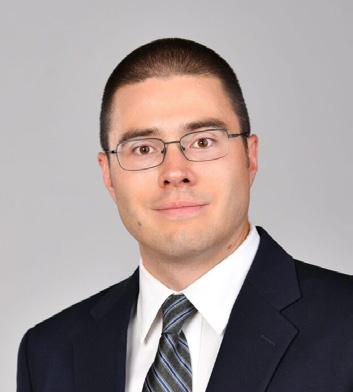
NICHOLAS


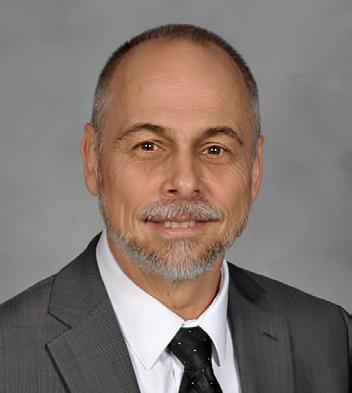




STEPHEN


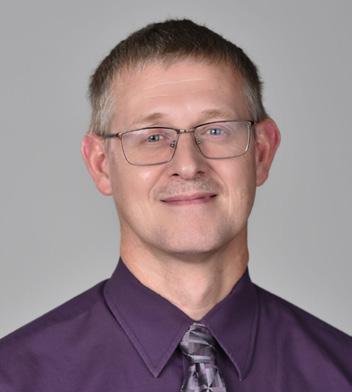

LUCAS





JOSEPH


DAN



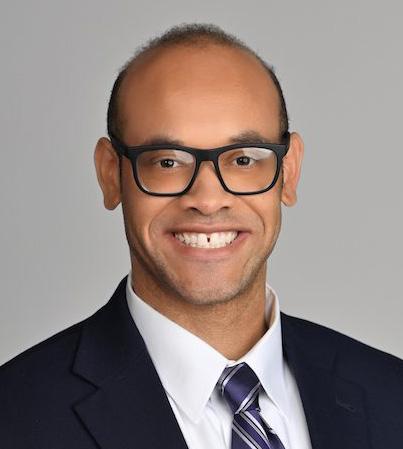





DANIEL
